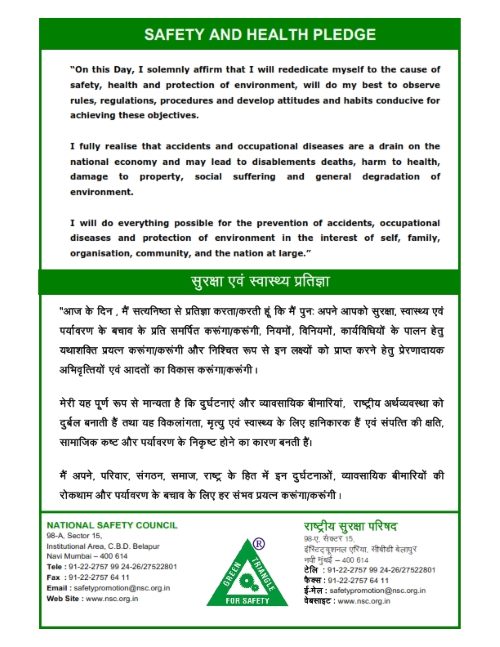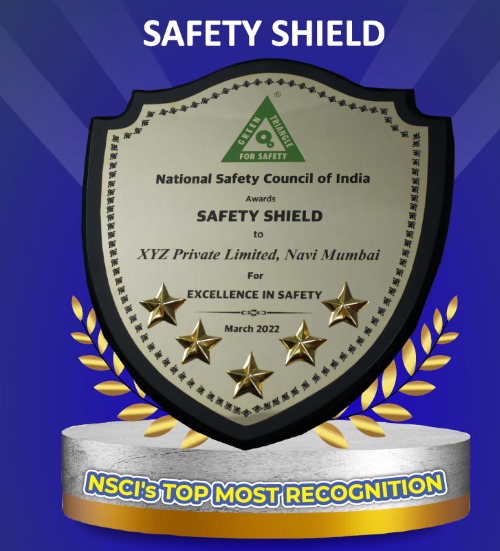About National Safety Day 2025
National Safety Day, observed annually on March 4, serves as a vital initiative to promote workplace and public safety across India. Led by the National Safety Council of India (NSC), this observance aims to instill a culture of safety awareness, accident prevention, and health consciousness. The 2025 edition marks the 54th year of this campaign, reinforcing the importance of occupational safety and environmental well-being. In this article, we will explore Nationa Saftey National Safety Day 2025 theme and what are the Safety Services provided by NSC
Theme of National Safety Day 2025
The theme for National Safety Day 2025 is "Safety and Well-being: Essential for Viksit Bharat" ("सुरक्षा और स्वास्थ्य - विकसित भारत के लिए अत्यावश्यक"). This theme highlights the significance of maintaining a safe and healthy environment as a cornerstone of national progress and development.
The National Safety Council (NSC) is a non-profit organisation dedicated to promoting safety at workplaces, roads, and communities. It provides various safety services to reduce injuries and fatalities and ensure compliance with safety standards. Let's explore NSC Services and what it provides:

Source:nsc.org
1. Workplace Safety Services

Source:nsc.org
1.1 Safety Training Programs
NSC offers training programs in multiple formats, including:
- Online courses: Self-paced learning modules covering occupational safety, risk assessment, and regulatory compliance.
- Virtual Instructor-led Training (VILT): Live training sessions conducted remotely by safety experts.
- On-site training: Tailored programs conducted at the organisation's premises.
- Train-the-Trainer programs: Equipping individuals to become certified safety trainers within their organisations.
1.2 Safety Audits and Compliance
NSC conducts workplace safety audits to assess the effectiveness of existing safety measures. These audits help in:
- Identifying potential hazards.
- Evaluating compliance with OSHA (Occupational Safety and Health Administration) standards.
- Offering recommendations for improvement.
- Providing third-party validation of workplace safety programs.
1.3 Safety Rating System

Source:nsc.org
NSC has developed a Safety Rating System that evaluates organisations based on key safety, health, and environmental (SHE) parameters. This system helps companies benchmark themselves against national and international standards.
| Safety Rating Categories | Criteria for Evaluation |
| Workplace Safety Policies | Presence and implementation of safety policies |
| Employee Training | Frequency and effectiveness of safety training |
| Incident Reporting System | Mechanism for tracking workplace accidents |
| Compliance with OSHA Standards | Adherence to legal safety regulations |
| Emergency Preparedness | Availability of fire exits, PPE, and first aid resources |
2. Driver Safety Training
NSC pioneered Defensive Driving Courses (DDC) to help reduce road accidents. These programs are designed for:
- Corporate fleets: Training employees to adopt safe driving behaviours, thereby reducing company liability.
- Public safety programs: Ensuring safer roads by educating individual drivers on defensive driving techniques.
- Online and in-person courses: Providing flexibility to suit different learning preferences.
Key benefits include:
- Reduction in traffic violations and accident rates.
- Potential reduction in insurance premiums.
- Improved driving records for employees and individuals.
3. First Aid and Emergency Preparedness
3.1 First Aid & CPR Training
NSC provides industry-leading First Aid, CPR, and AED (Automated External Defibrillator) training, ensuring organisations and individuals are prepared for emergencies. The training includes:
- Basic First Aid: Addressing minor injuries such as cuts, burns, and fractures.
- Cardiopulmonary Resuscitation (CPR): Teaching life-saving techniques for cardiac arrest situations.
- AED Training: Educating individuals on how to use defibrillators effectively.
- Advanced Medical Response: Specialised courses for healthcare professionals and first responders.
| Training Type | Purpose | Target Audience |
| Basic First Aid | Treating minor injuries | Employees, general public |
| CPR Training | Assisting cardiac arrest victims | Healthcare providers, corporate employees |
| AED Training | Proper usage of defibrillators | Public safety personnel |
| Advanced Medical Response | Managing severe trauma cases | Paramedics, first responders |
3.2 Emergency Preparedness Planning
NSC also assists organisations in developing Emergency Response Plans (ERP) for situations such as fire hazards, chemical spills, and natural disasters. These plans help companies to:
- Improve evacuation procedures.
- Train employees in crisis management.
- Conduct emergency drills and simulations.
4. Research and Safety Data Resources
NSC is committed to data-driven safety solutions. It provides resources such as:
- Injury Facts Database: A comprehensive statistical report on workplace injuries and fatalities.
- Safety Benchmarking Tools: Helping industries compare safety metrics with industry standards.
- White Papers & Reports: Research-based insights into accident prevention and emerging safety trends.
5. International Safety Services
Apart from U.S.-based training, NSC extends its services globally, offering:
- International OSHA compliance training.
- Safety consulting services for multinational companies.
- Cross-border driver safety programs.
These programs help businesses meet global safety standards and enhance their corporate responsibility efforts.

Source:nsc.org
Conclusion
The National Safety Council (NSC) plays a crucial role in workplace safety, driver training, first aid preparedness, and emergency response planning. NSC ensures that workplaces, roads, and communities remain safe by offering comprehensive safety training, audits, compliance solutions, and research-backed resources. Whether you're an employer, driver, or individual seeking safety education, NSC’s services provide the necessary tools to prevent accidents and save lives.
Comments
All Comments (0)
Join the conversation